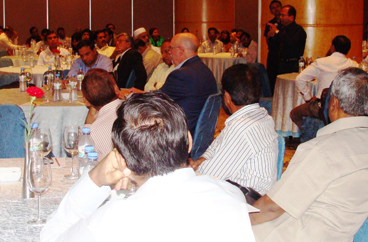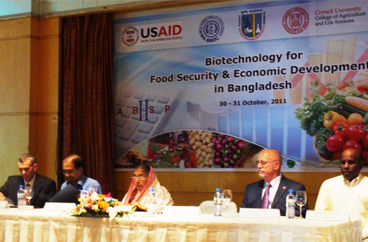The workshop on Biotechnology for Food Security and Economic Development in Bangladesh, under the aegis of the Bangladesh Agricultural Research Institute (BARI) in collaboration with the Agricultural Biotechnology Support Project II (ABSPII), was held in Dhaka, Bangladesh, from 30 to 31 October 2011. The aim of the workshop was to highlight the importance of biotechnology in agriculture and its necessity for ensuring food security in Bangladesh. The inaugural session of the workshop was graced by the presence of Matia Chowdhury, Hon’ble Minister of Agriculture, Government of Bangladesh (GoB), as Chief Guest;
Mr. C. Q. K. Mustaq Ahmed, Secretary, Ministry of Agriculture, GoB; Mr. Richard Greene, USAID Mission Director; Dr. Wais Kabir, Executive Chairman, Bangladesh Agricultural Research Council (BARC); Dr. Md. Rafiqul Islam Mondal, Director General, BARI; Prof. Ronnie Coffman, Chair, Department of Plant Breeding & Genetics & Director, International Programs, CALS, Cornell University; and Dr. Frank Shotkoski, Director, ABSPII, Cornell University.
Following the traditions of the host country, the program began with a short recitation from the Holy Quran. Dr. Md. Rafiqul Islam Mondal welcomed the participants and emphasized the importance of biotechnology in agriculture for ensuring food security in the country. Mr. Richard Greene, in his opening remarks, emphasized the need to accept modern technologies to increase yield in the face of a burgeoning population, reduced land availability, climate change, and other biotic and abiotic stresses. He also referred to the projects on Bt eggplant and late blight resistant (LBR) potato being carried out under the ABSPII and lauded Bangladesh’s commitment and efforts made to the excellent progress of such projects. Prof. Ronnie Coffman spoke of the stagnation in resource investment and growth in agriculture worldwide. Referring to the havoc of Ug99 in Africa and its surge across the globe, he stressed on the challenges for agriculture and the ways of ushering in change using safe technology. Mr. C. Q. K. Mustaq Ahmed elaborated the successful development of Bt eggplant with the help of USAID and Cornell University. He also appreciated BARI’s role in developing Bt eggplant and LBR potato, resulting in reduced pesticide use and a safer environment. Matia Chowdhury, in her speech as the Chief Guest, highlighted the severity of crop loss in Bangladesh due to abiotic and biotic stresses. She clarified that food security cannot be achieved by conventional breeding alone and required adoption of safe methods for promoting food production. She warned people to watch out for malicious rumors against genetically modified products and thanked USAID for its support in ensuring food security in the country and congratulated BARI for their role in ABSPII. Dr. Wais Kabir stressed on utilizing technology to reduce pressure on land and adopting a good regulatory framework to ensure the development of safe products using biotech. He urged scientists to investigate solutions that biotechnology can provide to maximize yield and thereby ensure food security in Bangladesh in the coming years.
During the two days of the workshop, distinguished biotech practitioners from developing and developed countries gave talks in their areas of expertise. Prof. Ronnie Coffman, Prof. K. V. Raman and Dr. Frank A. Shotkoski from the US; Mr. K. Vijayaraghavan, Dr. Partha Dasgupta, Dr. Usha Barwale Zehr and Dr. Sneh Pareek from India; Dr. Shahabuddin Ahmad, Dr. Tapan Kumar Dey and Dr. Tamal Lata Aditya from Bangladesh spoke on different aspects of biotechnology, the latest developments in the field of biotechnology, the role of ABSPII in promoting growth and sustenance and how biotechnology can benefit the world including Bangladesh.
During the deliberations the participants expressed that such congregations were both necessary and beneficial since they created platforms for interacting with global experts, exchanging ideas with the experts and leveraging their research and intellectual capabilities in the area of biotechnology.



